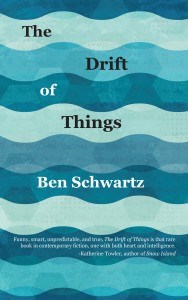MANCHESTER, N.H., July 15, 2014 (GLOBE NEWSWIRE) -- In 2008 Ben Schwartz—a young New Hampshire English and special education teacher—decided it was time to get that first novel written. He entered Southern New Hampshire University's low-residency MFA in Fiction and Nonfiction program, and wrote that novel—"The Drift of Things"—as his thesis.
Last month "The Drift of Things" was named the Silver Medal Winner in the Piscataqua Press's 2014 Novel Contest, one of three manuscripts plucked from some 120 submissions. And as quickly as that—in a world that now includes print-on-demand publishing—Schwartz's novel is available from Piscataqua.
"We're all very happy for Ben," said novelist/essayist Benjamin Nugent, the director of Southern New Hampshire's MFA program. "And we're looking forward to books by other alumni coming out soon from presses like Viking and Da Capo."
While at Southern New Hampshire, Schwartz worked primarily with novelists Katherine Towler ("Snow Island") and Merle Drown ("The Suburbs of Heaven") in crafting his story of a middle-aged man who has blamed himself for the drowning death of his best friend in high school, and who then returns for his mother's funeral to the town from which he has exiled himself.
"Funny, smart, unpredictable, and true, 'The Drift of Things' is that rare book in contemporary fiction, one with both heart and intelligence," wrote Katherine Towler in her response to the finished work. "Ben Schwartz has delivered a cast of characters so real you expect to find them watching TV in the living room. In a beautifully-crafted story about what remains broken and yet healed in all of us, Schwartz has established himself as a writer to watch."
Schwartz's story marks the latest publishing success for an MFA program that was founded in 2006 by historical novelist Robert Begiebing and that has only recently reached its full complement of 65 students and 15 faculty members.
Begiebing's vision involved a two-year program—with "Go Write Your Book" as its motto—in which students would immediately apply themselves to the completion of a publishable, professional-level manuscript, as Schwartz did.
Though the program's alumni community remains small, there were some immediate post-graduate successes: "If I Told You So" by Timothy Woodward '08, a novel that came out from Kensington in 2012; and "Lost and Found Hanoi," a work of photojournalism co-authored by Elizabeth Rush '11, which came out from the Things Asian Press earlier this year.
But now the floodgates are open, as a number of new alumni have recently turned their theses into book contracts, some with large commercial houses. Pratima Cranse '12 has a so-far-untitled novel in the works from Viking. "The Trees Beneath Us," a novel by Darren R. Leo '13, will initiate a new literary line of fiction from the Stark House Press. And Charlie Stella '13 is co-authoring a biography, "Dogfella," due out from Da Capo.
Other Southern New Hampshire alumni have novels on the production line at several small presses like Piscataqua. "The Holy Fool" by Ken Butler '12 is forthcoming from the Touchstone Press; "They Call Me Crazy" by Kelly Stone Gamble '12 from Red Adept Publishing; "Fallen" by Mike Hancock '08 and "The Keepers of Mercia" by James Marino '09, both from Black Rose Writing.
"This is a hard thing to do, taking your very first attempt at long-form fiction or nonfiction and getting it published," said Nugent. "But we're proving now that we can make Bob's go-write-your book model work. At the very least, our students are leaving the program with stories that have a fighting chance in the marketplace, and the skills to write more."
Nonetheless, Nugent said, he and his faculty are moving to diversify the program by also offering a curriculum track for those who want their MFA work to simply prepare them to write that first novel or nonfiction narrative—rather than to require writing it immediately.
"We think some students would benefit more from being able to experiment," Nugent said. "This would involve, for example, trying out lots of short stories or essays and throwing them out, or trying out a few novel or memoir ideas, and finally settling on one and getting it started. Students will still complete a thesis, but the parameters will be more flexible."
This model, said Nugent, would exist as an alternative to the go-write-your-book curriculum. "But if you're ready for that right now, as Ben Schwartz was," Nugent added, "you can still do that."
In the long run, this flexibility may well produce even more frequent publishing and literary successes for an MFA program building its credentials as a program-to-watch.
Photos accompanying this release are available at:
http://www.globenewswire.com/newsroom/prs/?pkgid=26487
http://www.globenewswire.com/newsroom/prs/?pkgid=26488

